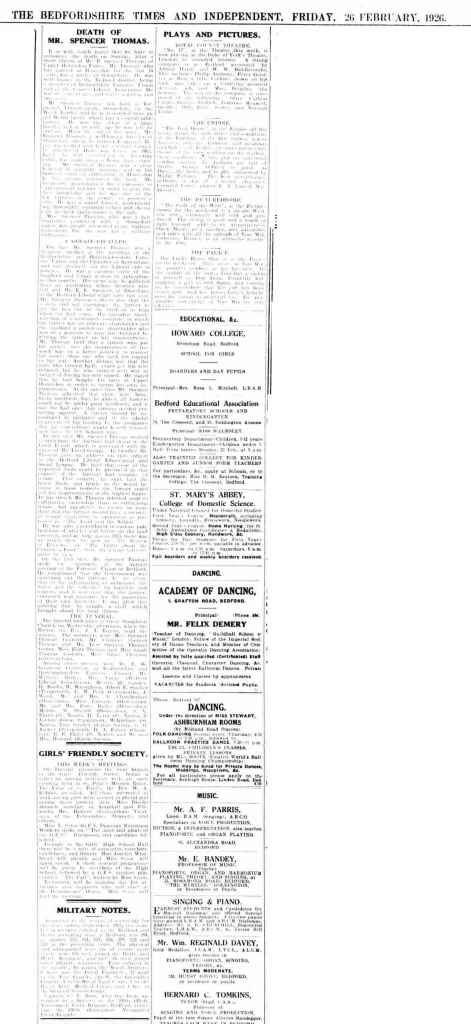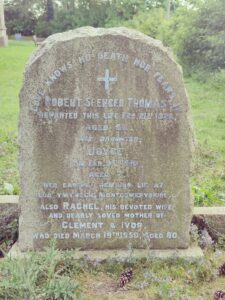Robert Spencer-Thomas
The following is a transcript of an article from the Bedfordshire Times and Independent, dated Friday 26 February 1926.
It details the life, death and funeral of my paternal grandfather, Robert Spencer-Thomas. Sadly, I never met him, as I was born fourteen years later. Even so, our family still share some fascinating stories about his life.
Death of Mr Spencer-Thomas
———
It is with much regret that we have to announce the death on Sunday, after a short illness, of Mr R Spencer-Thomas, of Upper Honeydon Farm. Mr Thomas, who has farmed at Honeydon for the last 14 years, was a native of Shropshire. He was well known in the Bedford district, being a member of Bedfordshire Farmers’ Union and of the County Liberal Association. He was 56 years of age, and leaves a widow and two sons.

Mr Spencer-Thomas was born at Treprenal, Llanymynech, Shropshire, on the Welsh border, and he is descended from an old Welsh family which has a considerable history. He was the eldest of a large family, and at an early age he was left an orphan. With the aid of his uncle, Mr Richard Thomas, a well-known breeder of Shropshire sheep, he farmed Treprenal. Being dissatisfied with being a ?tenant? farmer, he purchased Honeydon Farm in 1913. Lately, he had specialised in breeding cattle, his main interest being dairy farming. Mr Spencer Thomas was a great believer in scientific farming, and in his thirteen years of cultivation at Honeydon he has greatly improved the land. He frequently accompanied the excursions to experimental stations in order to gain further knowledge and he was one of the few farmers in the county to possess a silo. He was a sound farmer, understanding thoroughly manurial values and chemicals in their applications to the soil.
Mrs Spencer-Thomas, was a lady journalist connected with a Shropshire paper, was greatly interested in the Suffrage movement, but was as not a militant Suffragette.
A Debate Recalled
The late Mr Spencer-Thomas was a frequent speaker at the meetings of the Bedfordshire and Huntingdonshire Farmers’ Union and the Chamber of Agriculture, and was distinctly on the Liberal side in politics. He was a vigorous critic of the landlord and tenant system of agriculture in this country. His views may be gathered from an interesting debate between himself and Mr E. E. Spencer, of Bromham, at the Bedford Liberal Club early last year. Mr Spencer-Thomas’s thesis was that the system did not encourage the farmer to get the best out of the land or to reap where he had sown. His favourite simile was that of a mercantile company in which the farmer was an ordinary shareholder and the landlord a preference shareholder who was in a position to raise his dividend by renting the farmer on his improvements.
Mr Thomas held that a farmer who put his money into the improvement of livestock was in a better position to recover his money than one who sank his capital in the soil. Another dictum was that the man who farmed badly could get his rent reduced, but he who farmed well was in a danger of having his rent raised. He stated that he had bought his farm at Upper Honeydon in order to secure his own improvements. At the same time Mr Spencer-Thomas admitted that there were beneficent landlords, but, he added, all farmers could not be under good landlords, and it was the bad ones that farmers needed protecting against. A farmer should be encouraged in initiative and in the liberal treatment of his holding by the assurance that his expenditure would benefit himself and those who he left behind him.
In this view, Mr Spencer-Thomas seemed to anticipate the doctrine laid down in the Land Report which is associated with the name of Mr Lloyd George. In October, Mr Thomas gave an address on this subject to the Bedford Liberal Educational and Social League. He held that most of the imported foods could be produced in this country if the farmers had security of tenure. This country, he said, had the finest flocks and herds in the world because in these respects the farmer could sell his improvements at the highest figure. In his speech, Mr Thomas referred more to cultivating ownership than to cultivating tenure, but apparently he meant no more than that the farmer should have a security of tenure equivalent to ownership as proposed in “The Land and the Nation” .
He was also a contributor to various publications of articles and letters on the land question, and as long ago as 1913 there was an article from his pen in “The Review of Reviews” on “The Truth about the Country’s Food”, from the tenant farmer’s point of view.
On the 13th inst. Mr Spencer-Thomas spoke out vigorously at the annual meeting of the Farmers’ Union in Bedford. He complained that the Government was squeezing out the farmers by its attention to the safeguarding of industries, the doles*, and the subsidies for builders and miners, and it was time that the farmers concerted real measures for the protection of their own interests. It was after this meeting that he caught a chill which brought about his fatal illness.

The Funeral
The funeral took place at Great Staughton Church on Wednesday afternoon, when the Rector, the Rev J T Rogers read the Service. The mourners were Mrs Spencer-Thomas (widow), Mr Clement Spencer-Thomas and Mr Ivor Spencer-Thomas (sons), Miss Eliza Thomas and Miss Sarah Thomas (sisters), Miss Grace Clemson (sister-in-law).
Among those present were Mr B W Goodman (Secretary of Bedfordshire and Huntingdonshire Farmers’ Union), Mr William Bailey, Miss Lucas (Bedford Liberal Association), Messrs H Squires, H Banks, W Wroughton, Albert E Stocker (Tempsford), E M Peck (Colmworth), J Wad, Mr and Mrs A Chamberlain (Honeydon), Miss Lunnon?? (Honeydon), Mr and Mrs Percy Bailey (Honeydon), Messrs W Sheard (Honeydon) SV Ekins (St Neots) H Lynn (St Neots), J Jordan (Great Staughton), McKechnie (St Neots), Tom Stocker (Eaton Socon), G O Archer (Tempsford), H A Ealton (Chauston), R R Ekins (St Neots) and Mr and Mrs Howard (Eaton Socon).
*The original text was difficult to read in some places. I assume that the word “doles” means the welfare distribution, or the apportionment of money or food for disabled people. Perhaps many of the beneficiaries were among those wounded in The Great War. The word was in common use at this time.
Full article can be found at the British Newspaper Archive.
You will need to create an account, to access the article for free.
